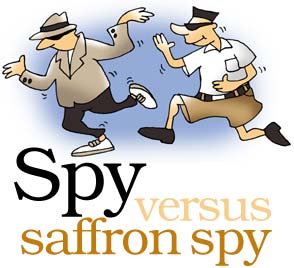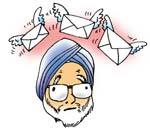
The title says it all. Open Secrets: India's Intelligence Unveiled, by Maloy Krishna Dhar, contains enough ammo to demolish many a carefully built reputation.
But most of what the former sleuth, who retired as joint director of the Intelligence Bureau, says about the country's leading men and women -- in politics, media, business, etc -- have been, well, open secrets.
The value of the book does not lie in its disclosures, for those inside the capital's power loop were already aware about the seamier side of these characters. It lies in the affirmation by the country's top intelligence operative of what were mere suspicions about the sleazy doings of the people in question.
Whether or not Dhar breached the Official Secrets Act in reproducing the dossiers is for the authorities to consider, but quite a few characters who have had their façade of respectability shredded to bits by the revelations will find it hard to rebut the author. Though he has refrained from naming some of the people he writes about, it is not hard to figure out who they are.
Here are some nuggets regarding the Sangh Parivar that demolish the myth that it is an exceptionally disciplined, or even straight, lot.
Dhar reveals when Vishwanath Pratap Singh became prime minister, Murli Manohar Joshi promoted Rajendra Prasad Joshi 's candidature as IB chief. 'Murli Manohar wanted his own man to lead the IB, an organisation that could virtually open up the treasure trove of intelligence to him. Rajendra Prasad, in his own turn, exploited the relationship to promote the interest of his prime minister. The RSS/BJP (Rashtriya Swayamsevak Sangh/Bharatiya Janata Party) were not aware that in his eagerness to exploit the IB, Murli Manohar was sharing consciously and subconsciously strategic information about the Hindutva organisation's forthcoming earthshaking policies.' (Page 378).
Then there is the anecdote which reveals how a Mumbai businessman curried favour with then prime minister Rajiv Gandhi. 'There was no reason for the IB not to have access to the inner thinking process and the operational strategy of the Sangh Parivar. The Hindu outfit was sufficiently infiltrated by the IB. Bombay-based industrialists close to Rajiv Gandhi had successfully cultivated a couple of RSS/BJP leaders, three of them journalists and one of the functionaries in Keshav Kunj (the RSS regional headquarters in New Delhi).'
'Two of the journalists were admitted to the Rajya Sabha during the BJP regime. I am unable to disclose the name of the Keshav Kunj functionary due to certain constraints, but he enjoyed a top position. One of the industrialists was personally very close to a parochial chauvinist leader of Maharashtra (read Shiv Sena boss Bal Thackeray). The Delhi office of the industrialist was in constant touch with Rajiv Gandhi and supplied him 'vital intelligence' on the Sangh Parivar.'
Prime minister vs his deputy
The Dhar book is a fascinating read, especially because it refers to events still fresh in one's memory. In the context of the long-standing Atal Bihari Vajpayee-L K Advani tussle, there is this interesting bit which also throws light on the demolition of the Babri Masjid on December 6, 1992.
Dhar maintains that IB agents assumed the identities of news cameramen of a national daily and stationed themselves at crucial points on the eventful day in Ayodhya. Their video footage conclusively established that Shiv Sena activists broke the cordon and began the demolition. Bal Thackeray is on record staking claim that the Sainiks had indeed demolished the mosque.
When the Justice Liberhan Commission, set up to investigate the demolition, was to question Advani, the latter asked him to arrange a copy of the said videotape for him so that he could establish his innocence. Dhar says he told Advani to speak to the then IB director, to retrieve the tape from the archives. 'I don't know if the DIB obliged Advani. The then DIB had established a close rapport with certain officials of the PMO (Prime Minister's Office) and I was told that he was advised by them not to produce the tape that could take Advani off the hook. The Sangh Parivar obviously was not a happy family.'(Page 471)
The Ambani-Wadia battle
 Remember the famous Ambani-Nusli Wadia spat that saw the two industrial houses -- Bombay Dyeing and Reliance -- accusing each other of skullduggery?
Remember the famous Ambani-Nusli Wadia spat that saw the two industrial houses -- Bombay Dyeing and Reliance -- accusing each other of skullduggery?
Writes Dhar: 'Around June 1994 a trouble-shooter of the Reliance Group of Industries approached me with an unusual request. The Reliance group was bent upon proving that Nusli Wadia possessed three passports, a British and a Pakistani one, in addition to the Indian passport. They wanted the Union home ministry to initiate a criminal case against the Bombay Dyeing chief under the Passport Act.
'I was approached to certify that the photocopy of the alleged Pakistani passport was a genuine copy of a genuine Pakistani passport. I did not oblige them because it was a clear case of forgery.'(Page 488)
Postings and politicians
 With Prime Minister Manmohan Singh refusing to assert his authority in the matter of postings and transfers, the field is wide open for assorted Congressmen and ministers to exploit this all-important power to their own advantage. Thus for all key appointments, senior bureaucrats invariably approach senior Congress leaders widely considered as part of the 10, Janpath (Sonia Gandhi's home) coterie.
With Prime Minister Manmohan Singh refusing to assert his authority in the matter of postings and transfers, the field is wide open for assorted Congressmen and ministers to exploit this all-important power to their own advantage. Thus for all key appointments, senior bureaucrats invariably approach senior Congress leaders widely considered as part of the 10, Janpath (Sonia Gandhi's home) coterie.
At least two powerful party general secretaries not only insist on foreknowledge about the impending official-level changes but inevitably also call the officers concerned informing them about their new posts. That way they not only manage to convey their clout with the PMO but also collect IOUs from the bureaucrats concerned.
Yes, minister
 Textiles Minister Shankarsinh Vaghela is so keen to retain the services of a particular Gujarat cadre officer that despite the PMO nixing the proposal, the officer continues to function as his personal secretary. Neither has the Gujarat government released the officer for a central deputation nor has the PMO cleared his posting as the minister's aide. However, an unfazed Vaghela persists with the officer as his Man Friday. Small wonder people are beginning to espy something fishy in this minister-babu nexus.
Textiles Minister Shankarsinh Vaghela is so keen to retain the services of a particular Gujarat cadre officer that despite the PMO nixing the proposal, the officer continues to function as his personal secretary. Neither has the Gujarat government released the officer for a central deputation nor has the PMO cleared his posting as the minister's aide. However, an unfazed Vaghela persists with the officer as his Man Friday. Small wonder people are beginning to espy something fishy in this minister-babu nexus.
Illustrations: Uttam Ghosh





